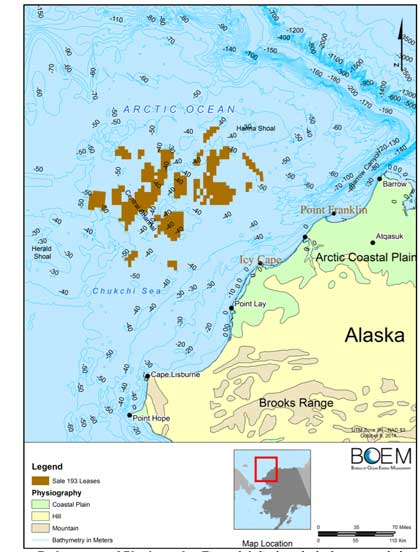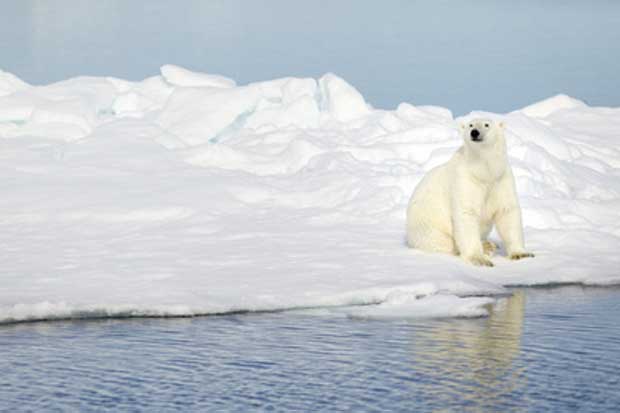Royal Dutch Shell has shelved plans to drill for oil in the Arctic off the coast of Alaska, in a move that signals more welcome relief for the climate just days after China announced it will introduce a landmark emissions trading scheme.
The multinational had been controversially embroiled in a proposal to open up a massive new carbon store in the Chukchi sea, drilling in the often-frozen waters that are ironically already proving hostile for the polar bears and walruses that rely on their shrinking ice for habitat.
Shell estimates the Arctic holds “around 400 billion barrels of oil equivalent, 10 times the total oil and gas produced in the North Sea to date,” but yesterday the company announced that it “will now cease further exploration activity in offshore Alaska for the forseeable future”.
The company said in a statement that its first Arctic exploration well, drilled this season around 150 miles off the Alaskan coast, “will be sealed and abandoned in accordance with U.S. regulations”.
Shell did find indications of oil and gas at the well, but they were “[not]sufficient to warrant further exploration”, and the company said efforts had been hampered by “the high costs associated with the project, and the challenging and unpredictable federal regulatory environment in offshore Alaska”.
The Anglo-American company had initially moved to drill the well during 2012, but in three separate incidents a ship and drilling rig ran aground, and a vessel carrying 139,000 gallons of diesel caught fire.

The company’s exploration rights were suspended, and when they were reinstated earlier this year the American administration came under intense pressure from environmentalists, particularly as Obama sought to make climate action the defining legacy of his Presidency with new regulations and loud advocacy on the international stage.
Obama was widely pilloried for the apparent hypocrisy of paving the way for the exploitation of a resource that scientists say conflicts with the action necessary to limit the rise in global temperatures.
The US Geological Survey estimates that the Arctic holds vast amounts of the world’s undiscovered fossil fuels, at 13 per cent of oil, 30 per cent of natural gas, and 22 per cent of natural gas liquids.
“Any exploitation of any of the resources in [the Arctic Region]is incompatible with effective action on climate change,” Professor Will Steffen from the Climate Council said in a recent report.
Almost as massive as these reserves are the environmental risks associated with drilling in the new Arctic frontier, which in the case of Shell centres on the unpredictable and often (although perhaps now less often) frozen waters of the Chukchi sea.
An environmental disaster – literally – is expected.
A study from the US agency that approved Shell’s exploratory drilling estimates there’s a 75 per cent chance of a ‘large’ oil spill, of more than 42,000 gallons, during the 77-year period considered.
It’s in this context that Greenpeace UK executive director John Sauven welcomed yesterday’s announcement, proclaiming “big oil has sustained an unmitigated defeat”.
“They had a budget of billions, we had a movement of millions,” he said. “The ‘unpredictable regulatory environment’ that forced Shell out of the Arctic is otherwise known as massive pressure from more than 7 million people.
“For three years we faced them down, and the people won.”
The company’s exploration activities have been consistently targeted in dramatic, high-profile protests, which have seen activists dangle from St Johns Bridge in Portland for 40 hours to block a Shell icebreaker, and form a human blockade with kayaks to stall an Arctic-bound rig.
In a series of cases brought by coalitions of environment groups, issues were also identified by the courts around the environmental analysis the US government had relied on in approving Shell’s lease.
The ‘frontier war’ being waged over the Arctic is unlikely to stop with Shell’s announcement, though, with the company reaffirming that it “continues to see important exploration potential in the basin, and the area is likely to ultimately be of strategic importance to Alaska and the US”.

The prospect of Arctic drilling — by Shell or any of the other companies planning to exploit the virgin reserves, often under the environmental authority of other countries — remains very much alive.
Still, Greenpeace International Executive Director Kumi Naidoo greeted Shell’s decision to shelve the project as “a defining day for the Arctic”.
“Shell has gambled big and lost big, both in terms of financial cost [around $7 billion to date]and its public reputation,” Naidoo said.
“This has become the most controversial oil project in the world, and despite its bluster Shell has been forced to walk away with nothing.”
Donate To New Matilda
New Matilda is a small, independent media outlet. We survive through reader contributions, and never losing a lawsuit. If you got something from this article, giving something back helps us to continue speaking truth to power. Every little bit counts.




